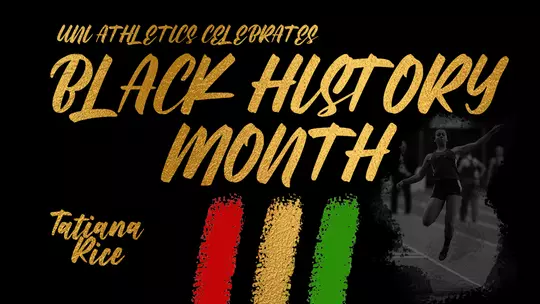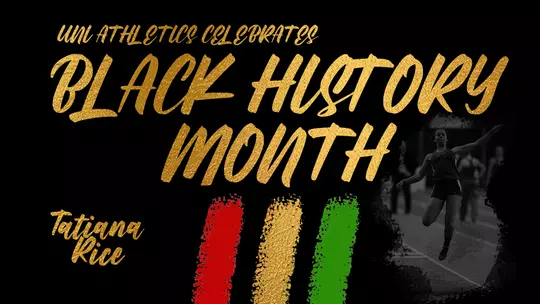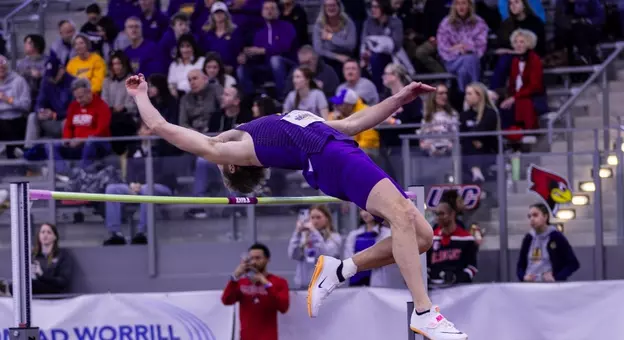
UNI Celebrates Black History Month - Tatiana Rice
2/11/2021

Former UNI Women’s Track & Field Athlete Tatiana Rice isn’t one to sit back in her professional or personal life. She has always been a driven individual, striving to be a leader in every aspect.
Rice started at UNI in 2012 and graduated in 2016 with a degree in Criminology and was on the track and field team as a long and triple jumper. On top of being a student-athlete, she was involved with student government on campus, was on the debate team, and in the honors society.
“I had in my mind that I wanted to do something that would help change the world or make society a better place.”
Being heavily engaged on campus while remaining a student-athlete helped Rice develop time management and communication skills that she now has applied to her job as a lawyer, and being a founder of her own arthouse for black artists. After UNI, her academic journey continued onto Washington University in St. Louis, Missouri where she obtained her law degree and now holds a position with Shook, Hardy & Bacon law firm.
Rice said after she had taken all the criminology courses at UNI she realized many of the societal issues now that we’re seeing with the Black Lives Matter Movement, really comes down to the laws our country has. She said not only how they are drafted and created but also how they are being enforced, and how the laws are applied to different sub-populations.
“I thought law was the best avenue for me to accomplish all those angles,” she said.
“If we could be a mainstream platform featuring black artists, that would be huge in being able to bring artists to the forefront when they should be considering black artists have contributed so much to our society but have gone unrecognized.”Tatiana Rice
Rice said as members of society, we must take the time every day, especially during Black History Month, to think about what it means to be black today. We also must make it our responsibility to think about what we’re doing to contribute to racial justice because each person helping in these small ways ultimately leads to collective action and change.
Actions universities and peers can do is to be inclusive and remain mindful. It’s as simple as that. Rice said it’s important to have campus and online resources, such as the Black Student Union, to hold those uncomfortable or hard conversations, be open and diversify yourself and your network.
“It goes a long way to help black students, black student-athletes, and the black community as a whole, feel supported and heard.”
To help contribute to the black community in Washington D.C., where Rice is settled, she has founded BlkArthouse.
Rice said it started as a solo project when she was first moving into her apartment. She said she knew right away that she wanted to collect art, specifically by black artists to not only help people that looked like her but also reflected her, and her identity. Although Rice does not have a background in art and stated she doesn’t know much about it, she said she just had to have it and began researching only to find out that there wasn’t a central platform for black artists at that time.
“I sat on the idea of creating a central and accessible location for black artists and their artwork.”
She said that the idea didn’t come to life until last May when George Floyd was murdered and that is when she said she began talking more with black artists, learning more about the specific community, and ultimately had many people reach out to her.
The mission of the BlkArthouse is to empower, support and represent black artists, who for so long have gone without a platform to feel heard and sell their work. Rice said that the BlkArthouse is dedicated to helping their artists spread the word of their work, learn the business skills in the art industry and build their careers by gaining new connections.
She said the BlkArthouse is ever-growing and has high hopes to be one of the large contenders for art market places.
“If we could be a mainstream platform featuring black artists, that would be huge in being able to bring artists to the forefront when they should be considering black artists have contributed so much to our society but have gone unrecognized.”
Rice said she is confident she will return to the midwest in her future, and when she does she wants to make a mark that minorities, LGBTQ+, and others are heard and represented because she said she too knows how it feels to be a super minority.
She has goals to tackle criminal justice reform and wants to devote herself more to diversification and integration of the black community, as a lawyer and founder of the BlkArthouse.




